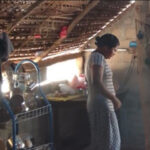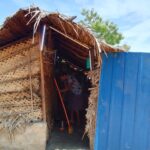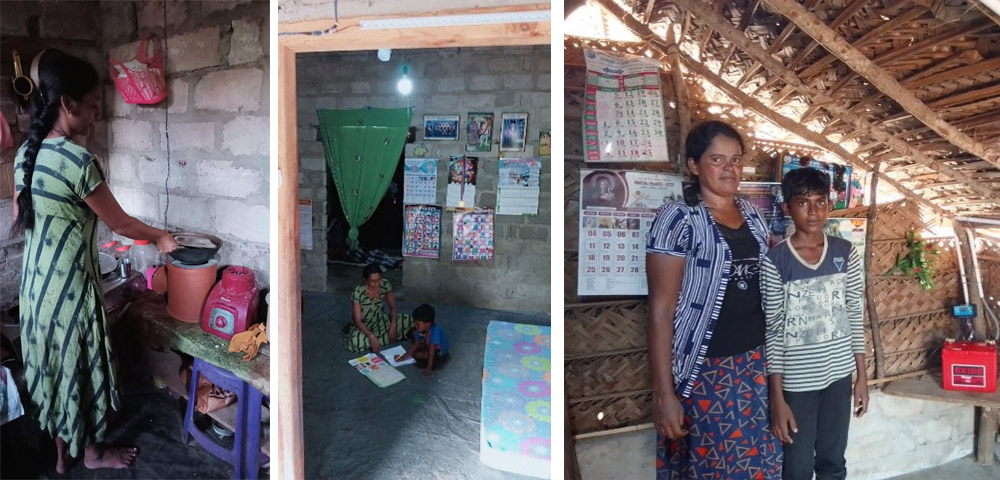Emergency Support Initiative for Green Building Based Prevention and Control Measures for Vulnerable Communities in Mullaitivu District.
| Funded by | Government of Japan |
| Budget | USD 452,611 (JPY 48,882,000) |
| Implemented by | United Nations Human Settlements Programme (UN-Habitat) |
| Partners | Ministry of Public Administration, Home Affairs, Provincial Councils and Local Government, District Secretariats, Government Agent of Mullaitivu District, Divisional Secretariats, Provincial Government of Northern Province, Community Based Organisations in target communities and Department of National Planning |
| Duration | 12 months (February 2022 to February 2023) |
| Location | Mullaitivu District, five (5) Divisional Secretariat (DS) Divisions (the administrative subunits) Manthai East, Maritimepattu, Oddusuddan, Puthukkudiyiruppu, Thunukkai and Weli Oya |
Project Description
Background
Extreme weather conditions and COVID-19 pandemic have contributed to a plethora of issues with the health systems and is predicted to have enormous consequences not only in healthcare but in many other aspects. Many of these unpredictable and strong weather conditions require countries to take actions which promotes quick remedial actions supported by behavioral change and improving living conditions. Poor communities are highly susceptible to such unprecedented weather-related risks and transmission of COVID-19 due to lack of resilience capacity owing to poor living standards and more importantly deteriorating economic conditions due to lockdowns and restrictions.
Under the situation, need of quick actions to support population in vulnerable situations was prioritised. UN-Habitat implements a community-based approach, that ensures community support and ownership for humanitarian aid. This further guarantees the interventions contribute to durable solutions to crisis and increased human security through integrating such actions to mainstream recovery process. This project approach is fully aligned with the Government of Japan’s development approach – humanitarian-development nexus by providing lifesaving humanitarian assistance with the vulnerable people in need to stabilise their quality of life which will result in reintegrating them into the society as continuum sustainable development. The project is implemented in three countries, namely Cambodia, Nepal, and Sri Lanka.
In Sri Lanka, Mullaitivu district was shortlisted as the area which the project will be implemented. The District is considered as one of the Districts with a very high vulnerability to changes in the climate and extreme weather conditions. Located on the Eastern side of the Northern Province of Sri Lanka the Mullaitivu District was under the pressure of the civil conflict. The Northern Province is considered an economically and socially lagging region and has the second highest percentage of poor households, which is 11.5% (based on the official poverty index) and has a resettled population of 138,321 (resettled in 2019 in their place of origin after displacement due to 30 years of civil conflict). Mullaitivu District is considered as one of the Districts with a very high vulnerability to changes in the climate and extreme weather conditions.
The Project
 The project is to reduce the urgent risks to health and wellbeing of the people, associated with poor basic facilities and living environment of houses. It contributes to safer and cleaner cities in the Asia and Pacific region during the COVID-19 pandemic through green building initiatives that further contributes to the commitments of the countries to reduce carbon emission.
The project is to reduce the urgent risks to health and wellbeing of the people, associated with poor basic facilities and living environment of houses. It contributes to safer and cleaner cities in the Asia and Pacific region during the COVID-19 pandemic through green building initiatives that further contributes to the commitments of the countries to reduce carbon emission.
 Furthermore, the project will address and prevent foreseeable incidents related to health and social issues of population living in vulnerable settlements such as poor indoor air quality, ventilation and lighting and lack of energy efficiency. The project will demonstrate replicable green building models for many cities facing similar challenges. The activity will also reduce the socio- economic vulnerability through improving healthy living conditions and providing alternatives for energy efficiency thus reducing economic burden and further the carbon footprint of the households.
Furthermore, the project will address and prevent foreseeable incidents related to health and social issues of population living in vulnerable settlements such as poor indoor air quality, ventilation and lighting and lack of energy efficiency. The project will demonstrate replicable green building models for many cities facing similar challenges. The activity will also reduce the socio- economic vulnerability through improving healthy living conditions and providing alternatives for energy efficiency thus reducing economic burden and further the carbon footprint of the households.
 Project will contribute to increase resilience in the cities through partnerships for Resilience. It also aligns with supporting developing nations to reach UNFCC commitments and learn from Japan’s policy on reaching carbon neutrality and transforming society and the economy with groundbreaking new technologies. In this aspect, transfer of Japan’s state of art technologies to developing nations contribution for reinforcing the world’s strategy against climate change. The project supports more than 150 households in Mullaitivu District in Sri Lanka
Project will contribute to increase resilience in the cities through partnerships for Resilience. It also aligns with supporting developing nations to reach UNFCC commitments and learn from Japan’s policy on reaching carbon neutrality and transforming society and the economy with groundbreaking new technologies. In this aspect, transfer of Japan’s state of art technologies to developing nations contribution for reinforcing the world’s strategy against climate change. The project supports more than 150 households in Mullaitivu District in Sri Lanka
Implementation Modality
In the process of implementation in Sri Lanka, the team will work closely with Government Agent of Mullaitivu District, CBOs in target communities, Provincial Government of Northern Province and Department of National Planning at the national level.
UN-Habitat Regional Office for Asia and the Pacific (ROAP) in Fukuoka, Japan is caring out the overall coordination of the project and coordinate with Japanese institutions. ROAP is providing technical guidance and supervision in implementing the project. Furthermore, ROAP will deploy regional experts as required and explore possible technical inputs from Japanese experts and provide full technical backstopping support to country officers.
Outputs and Activities
The main project activities in selected cities in Cambodia, Nepal, and Sri Lanka are as follows:
- Develop community based rapid assessment system to identify urgent green building improvements to promote healthy living conditions in vulnerable communities for efficient use of energy, water, and other resources.
- Provide clean energy options mainly energy efficient cooking stoves to reduce their vulnerability to respiratory infections due to cooking with polluting fuels and technologies worsening air quality inside houses.
- Provide alternative energy options for lighting and electricity, directly contributing to reduce operation cost for the urban poor households who will be able to access affordable energy options to support their day-to-day life and livelihood activities. Contribution to the SDGs.
